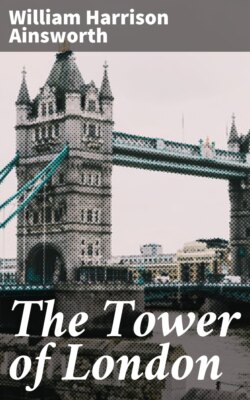Читать книгу The Tower of London - William Harrison Ainsworth - Страница 26
На сайте Литреса книга снята с продажи.
VII.—HOW CUTHBERT CHOLMONDELEY WAS THROWN INTO A DUNGEON NEAR THE DEVILIN TOWER; AND HOW A MYSTERIOUS FEMALE FIGURE APPEARED TO HIM THERE.
ОглавлениеTable of Contents
On recovering from the stunning effects of the blow he had received, Cuthbert Cholmondeley found himself stretched on the floor of a gloomy vault, or dungeon, for such he judged it. At first, he thought he must be dreaming, and tried to shake off the horrible nightmare by which he supposed himself oppressed. But a moment’s reflection undeceived him; and starting to his feet, he endeavoured to explore the cell in which he was confined. A heavy chain, which bound his leg to the floor, prevented him from moving more than a few paces; and, convinced that escape was impossible, he sank upon the ground in despair.
Unable to assign any cause for his imprisonment, and wholly at a loss to imagine what offence he had committed, he taxed his brain as to everything that had recently happened to him. This naturally directed his thoughts to the fair Cicely—and with her gentle image came the recollection of the malicious countenance and threatening gestures of Lawrence Nightgall. Remembering what Magog had told him of the jealousy and vindictive nature of this person, and remembering also that he had heard him described as the chief jailer, he felt that he need seek no further for the motive and the author of his imprisonment.
The assurance, however, which he had thus gained, afforded him no consolation, but rather tended to increase his disquietude. If he had been a prisoner of state, he might have hoped for eventual release; but placed in the hands of so remorseless and unscrupulous an enemy as Nightgall had shown himself, he felt he had little to hope. This consideration filled him with anguish, which was heightened as he thought of the triumph of his savage rival, who by some means—for he seemed desperate enough to have recourse to any expedient—might possess himself of the object of his passion. Fired by this thought, Cholmondeley again sprang to his feet, and strove with all his force to burst his bondage. But the effort was fruitless; and by lacerating his hands, and straining his limbs, he only added bodily torture to his mental suffering. Exhausted at length, he sank once more upon the floor.
By this time, having become habituated to the gloom of the place, he fancied he could make out that it was an arched cell of a few feet in width, and corresponding height. The only light admitted was from the entrance, which appeared to open upon a passage branching off on the left, and upon a further range of dungeons extending in the same direction.
Not altogether unacquainted with the prisons of the Tower, Cholmondeley felt against the walls to try whether he could find any of those melancholy memorials which their unfortunate inmates delighted to bequeath to their successors, and which might serve as a clue to the particular place of his confinement. But nothing but the smooth surface of the stone met his touch. This circumstance, however, and the peculiar form of the cell, induced him to think that it must be situated beneath, or at no great distance from the Devilin Tower, as he had heard of a range of subterranean dungeons in that quarter: and, it may be added, he was right in his conjecture.
The cell in which he was thrown was part of a series of such dreadful receptacles, contrived in the thickness of the ballium wall, and extending from the Beauchamp Tower to the Devilin Tower. They were appropriated to those prisoners who were doomed to confinement for life.
Horrible recollections then flashed upon his mind of the dreadful sufferings he had heard that the miserable wretches immured in these dungeons underwent—how some were tortured—some destroyed by secret and expeditious means—others by the more lingering process of starvation. As the latter idea crossed him, he involuntarily stretched out his hand to ascertain whether any provisions had been left him; but he could find none.
The blood froze in his veins as he thought of dying thus; his hair stiffened upon his head; and he was only prevented from crying out to make his lamentable case known to the occupants of any of the adjoining cells, by the conviction of its utter futility. But this feeling passed away, and was succeeded by calmer and more consolatory reflections. While in this frame of mind, Nature asserted her sway, and he dropped asleep.
